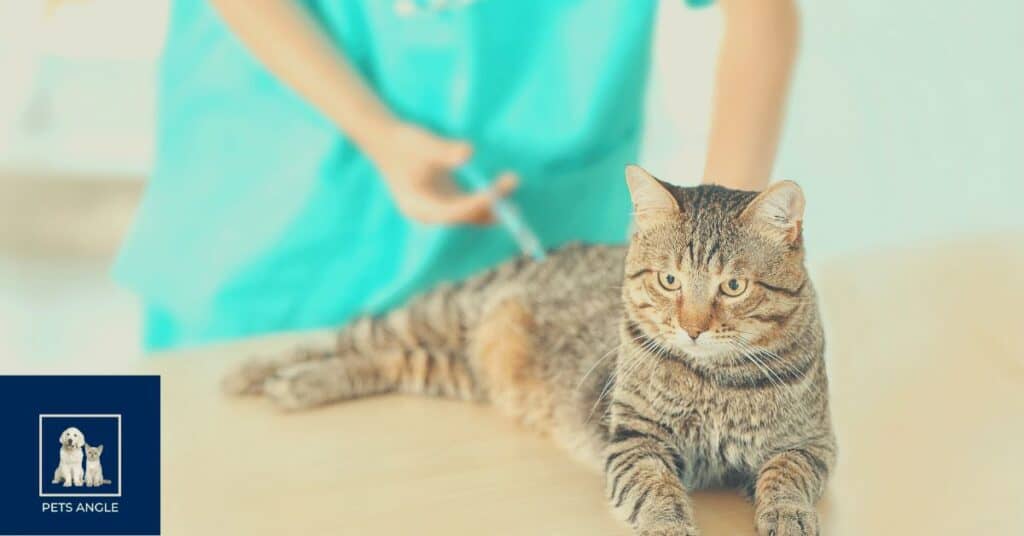All felines are bound by law to be vaccinated against rabies. Kittens are typically vaccinated once around four months old or within the first year of their lives. This vaccination is effective for one year after the first dose.
Adult cats with the complete booster round of immunizations should have their shots updated every three years, depending on their environmental risk.
Slight variations in injection frequency may be attributable to different states’ immunization laws.
If you live in a state or area where there are no basic immunization requirements, it is recommended that you seek professional advice from your veterinarian.
What is Rabies, and How Does it Spread?
Rabies is a lethal disease that affects people and animals who are unlucky enough to be bitten or scratched by a rabid animal. Like a deadly virus, rabies can cause inflammation in the brains of humans and other mammals.
As a result, extra steps must be taken to ensure that we are all protected. Rabid animals don’t act like normal animals; they can be overly friendly or aggressive.
Whether your cat lives indoors, outdoors, or a combination of the two, cats are still susceptible to infections transmitted by their surroundings and other animals. It is, however, more common in areas where stray animals, such as dogs and cats, are present.
How Can Indoor Cats Get Rabies and Why Is Rabies Vaccination Required?
Most cat owners question why they should be concerned about their indoor cats contracting rabies. Still, I can assure you that your feline’s residence status does not guarantee its safety from diseases on the other side of the door.
When indoor cats escape through a crack or the windows, they may become infected.
Use cat carriers when transporting cats to the vet. The objective is to prevent a cat’s escape in case of an accident.
Bats are one of the most common carriers of rabies, and these stray birds get into our homes through cracks and crevices.
Indoor kitties assert territorial authority and demonstrate their hunting instinct by pursuing the bats. When indoor cats come into contact with such stary bats, they can quickly become ill.
As a result, in addition to the protective reason, it is required to obtain your pet the anti-rabies vaccination to ensure compliance with state legislation.
Rabies Infection Symptoms
When a rabid animal bites another animal, it takes up to six months for the infection to develop.
The following are the symptoms that appear once the infection has been incubated:
- Appetite loss
- Anxiety, impatience, fear, or hyperexcitability
- Sudden and severe behavioral changes
- Worsening and unexplained paralysis
- Drooling or foaming at the mouth
- Difficulty swallowing
- Seizures
Rabies Safety Precautions
a. Vaccinate your pets;
b. Keep your pets away from other outside cats and stray cats;
c. Contact the authorities if you see any stray animals;
d. Maintain proper hygiene;
e. Protect your pets from aggressors and other predators.
f. Keep bats away from your home and confined
g. Keep wild creatures at bay.
Indications of a Significant Reaction to Rabies Shots
While major reactions to immunizations are unusual in cats, when they do occur, indications of a severe reaction will typically appear after the vaccine is delivered but can take up to 48 hours.
There are usually some unavoidable adverse effects when it comes to vaccinating cats, such as
fever, lethargy, loss of appetite, vomiting, diarrhea, swelling and redness surrounding the injection site, lameness, excessive weakness, and unexplained collapse.
What Should You Do If Your Cat Has a Reaction to Rabies Vaccines?
Corticosteroids, antihistamines, and related anti-inflammatory medications can treat mild to severe allergic reactions.
A cat with a mild or severe adverse reaction to immunizations should be fine within a week.
Consequences of Not Having a Current Rabies Vaccination for Cats
Cats bite for various causes, including fear, anger, and over-excitement. When these bites occur, medical practitioners who treat the bite wounds file reports with health units to keep track of them.
Rabies vaccination evidence is frequently requested to ascertain the risk potential of the attacking cat. The vaccination certificate is also helpful in checking for compliance with the state’s vaccination regulations.
The owner’s inability to submit the latest rabies shot certificate may have unfavorable consequences for both the owner and the kitty. The consequences can include, but are not limited to, the following: The consequences can include, but are not limited to, the following:
1. A penalty against the cat owner for keeping an unvaccinated pet.
2. A quarantine for the cat.
3. Euthanasia for the animal if it tests positive for rabies or is proven to be unwell.
Rabies casualties in the United States are pretty low compared to most nations that do not pay much attention to the disease. The low number of rabies infections is because each state in the United States has strict animal and immunization legislation.
Strict animal vaccination law is done to prevent the spread of rabies, which is hard to treat once symptoms show.

